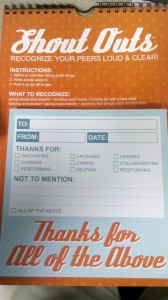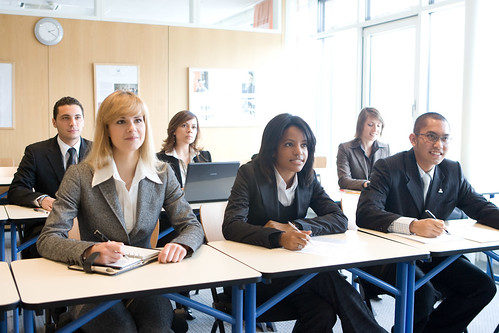My first concurrent session at HR Florida was titled “Developing an Effective, No Cost Recognition Program.” Truthfully, it was my second choice because the other one I wanted to attend was unavailable, but it was a suitable replacement. The speaker, Todd Efird, gave us some great information on using recognition at work. While the examples focused around construction safety, there were still some solid takeaways for someone working in a corporate environment.
Incentives: doing it wrong and doing it right
It’s the classic problem with workplace safety incentive programs, really. When you base someone’s incentive on not reporting accidents and injuries, you have unintended consequences like suppressed reporting, a negative view of the program, etc.
Instead of following the old mentality, a better, more effective way of operating the program is to incorporate positive recognition that is timely, relevant, sincere, and tied to individual performance.
Praise vs. Recognition
One of the best comments during the session was when the speaker differentiated between praise and recognition at work.
- Praise is basically a quick, simple “attaboy” or “attagirl” for a job well done. For example, telling someone “Great job on that presentation” is praise.
- Recognition is a two-way communication that requires a confirmation from the employee. For example, telling someone “I thought that presentation was killer, what about you?” is a way of making sure they understand the feedback and it opens the dialog for further interaction/engagement.
Leaving that response open ended is the key, really. Allowing someone to respond with a “yes” or “no” will not necessarily get the results you’re looking for. Conversely, if you leave the conversation hanging and allow them to respond, you not only get potentially valuable information, but you also continue the conversation and make it memorable in their mind.
Open ended questions also help supervisors to lead people to the right answer. That flies in the face of the old school “catch them doing it wrong” type thinking.
Key quotes/takeaways
- Most employees know what you don’t want already. Share with them what you do want. Then recognize them when they do it.
- If you’re wanting to recognize people, keep looking for the right they’re doing, not the wrong. More people are doing it right than wrong at any given moment.
- Start meetings with “here’s how we did well” instead of “here’s where you screwed up.” That approach opens people up to feedback.
- Find out if employees want to get recognition in front of peers or not. Some studies show hourly workers want it privately so they aren’t seen as “sucking up” to the boss.
- Every organization has people who are impervious to positive recognition/feedback efforts. They’re called CAVEmen: Citizens Against Virtually Everything.
All in all it was a fantastic session and I’m glad I attended. We have some recognition tools we’re using currently, but these free, relatively simple concepts can have a major impact on the people nonetheless.
Stay tuned for more posts coming to you live from HR Florida 2011!

